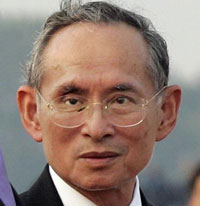Thailand's King pleads for his people to be united in birthday speech
Bhumibol Adulyadej, Thailand's King, delivered his annual birthday speech and appealed to his people for unity to safeguard the nation.

Bhumibol, who is the world's longest-serving monarch and turns 80 Wednesday, made the speech ahead of a potentially divisive general election later this month.
There are also widespread concerns about the beloved king's health and eventual succession.
Bhumibol likened the country's situation to difficulties he has recently had in walking.
"Whether soldiers or civilians, (we) must be united, like our legs that must be united which means one goes forward and one pushes back before moving forward," he said. "This way, we could walk without falling. Without unity, the country will face disaster."
He spoke for just over an hour, despite his recent hospitalization for symptoms of a stroke.
The speech, delivered in front of senior government officials and other specially invited guests, was broadcast live on national radio, and later on television.
The Dec. 23 election will be the first since a September 2006 coup toppled the elected government of former Prime Minister Thaksin Shinawatra, whom the king had criticized in previous birthday speeches.
Although there had been massive protests demanding Thaksin resign over alleged corruption and abuse of power, some experts on Thai politics saw his forced exit as a result of pressure from royal advisers.
The king, a constitutional monarch since 1946 with no formal political role, did not comment on the coming election in his speech.
His points were sometimes vague, because he tends to speak indirectly and with a dash of irony.
But in remarks that appeared to be supportive of the military, he said that if there was the money to spend, the country should buy "planes, submarines, tanks." The military received a vast increase in its budget after last year's coup, a move which drew some criticism from the press and public.
He also seemed to encourage spending by the public at large, at the same time cautioning people who cannot afford to.
Heightened uncertainty after the coup left consumers reluctant to spend and businesses wary of making new investments, hurting economic growth despite a series of interest rate cuts.
Thai people almost universally revere the king. They look to him as a national unifier, and his profile has been high in the past two years of political uncertainty.
The demonstrations that ousted Thaksin destabilized Thai politics, and the military-installed regime that succeeded him has failed to restore public confidence.
Polls show that allies of Thaksin, who is in self-imposed exile, are among the election campaign's front-runners a fact that strengthens the ex-prime minister's claims to having been a democratic leader, and that could partly discredit those who overthrew him.
A longer-term worry is how smooth Bhumibol's eventual succession will be. The king has never publicly commented on the issue, which weighs heavily on Thais' minds every time he has had a health crisis.
Bhumibol checked out of a hospital Nov. 7 after three weeks of treatment for a colon infection, and for what the palace described as inadequate blood flow to his brain. He has suffered several ailments, including heart problems, in recent years.
His son, Crown Prince Vajiralongkorn, has been groomed to succeed him. But the 55-year-old prince has a less conciliatory personality than his father, and there is speculation he will find it difficult to live up to Bhumibol's record of hard work and diligence.
Subscribe to Pravda.Ru Telegram channel, Facebook, RSS!


